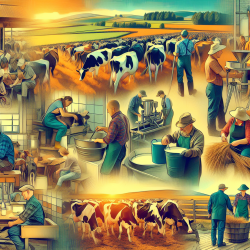The mental health of farmers, particularly those involved in dairy farming, is a growing concern. The study "Examination of Symptoms of Depression among Cooperative Dairy Farmers" provides valuable insights into the factors influencing depression among this demographic. As practitioners, understanding these findings can help us improve our approaches to supporting farmers' mental health.
The Role of Cooperatives and Social Support
A key finding from the study is the dual role of cooperatives (co-ops) in either mitigating or exacerbating symptoms of depression among farmers. Co-ops offer a range of services and engagement activities that can influence mental health outcomes. Educational opportunities and mentorship programs provided by co-ops were associated with reduced symptoms of depression. These programs offer farmers a chance to learn, connect, and grow within their community.
Conversely, involvement in co-op policy discussions was linked to increased symptoms of depression. This may be due to the stress associated with decision-making processes and time commitments that detract from farming activities. Understanding these dynamics is crucial for practitioners aiming to support farmers effectively.
Implications for Practice
Practitioners can leverage these insights by advocating for more educational and mentorship opportunities within co-ops. Encouraging participation in these programs can provide farmers with valuable skills and a supportive network. Additionally, practitioners should be aware of the potential stressors associated with policy discussions and work to provide coping strategies or alternative forms of engagement for those affected.
Encouraging Further Research
The study highlights the need for further research into how specific co-op programs impact mental health. Practitioners are encouraged to contribute to this body of knowledge by conducting studies or collaborating with researchers to explore these relationships further. Understanding the nuanced effects of different types of social support and co-op activities will enable more targeted interventions.
Conclusion
The mental health challenges faced by dairy farmers are complex and multifaceted. By integrating findings from current research into practice, practitioners can play a pivotal role in enhancing the well-being of this vital community. Continued exploration and adaptation of cooperative resources are essential steps toward reducing depression and improving overall mental health outcomes for farmers.
To read the original research paper, please follow this link: Examination of Symptoms of Depression among Cooperative Dairy Farmers.










